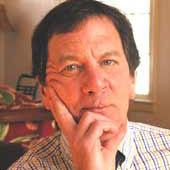Hong Kong — A Failure To Celebrate?
What makes Hong Kong's political crisis a beacon of hope?
January 21, 2004

Five years after China regained control over the former British colony, Hong Kong now stands as a failed political experiment. But it is a failure we should all celebrate.
In hindsight, there was never any chance Beijing could have avoided a confrontation with a population whose democratic aspirations are not only persistent — but also spreading more widely throughout the territory.
With Hong Kong's Chief Executive Tung Chee-hwa facing increasing calls to resign — and with Beijing clearly confused as to how to react to the territory's huge demonstrations — there are many lessons to be learned. Here are the three most important:
First, the exchange of material prosperity for authoritarian rule is yesteryear's social contract. Common enough across Asia during the Cold War, it is the essence of what China is attempting now — on the mainland as well as in Hong Kong.
But it does not work. We're seeing this in Hong Kong now, and there is every sign that we will eventually see it (again) on the mainland itself.
Second, ours is not an age in which the democratic aspirations of any population can go unsatisfied indefinitely. The notion that there is a straight-line relationship between economic development and democracy has always been tempting, but never decisively proven.
Japan is an example: It ranks among the world's wealthiest nations. And yet, it features a deeply dysfunctional political process that is democratic in name only.
At the same time, a relationship of some sort between prosperity and representative government is undeniable. South Korea stands as a classic example in this case. Now, Hong Kong does, too.
The final lesson is this: While Hong Kong's protests have drawn residents of all ages, the power and presence of local youth has been unmistakable. The lesson here extends far beyond the Special Autonomous Region (SAR), as Beijing officially designates Hong Kong.
The Internet-connected youth — as at home with cellular phones and in cyberspace as in the material world — are a new force in the globalization process.
Having lived in Hong Kong for many years — including the period when Britain and China negotiated the territory's future above the heads of its residents — it was as plain as day then that an essential feature of the local population’s perspective was missed.
Hong Kong was long a city of transients — primarily refugees from the Communist revolution in 1949 — and as such offered no one any strong sense of identity. This changed as the children of these now-aging generations of former mainlanders grew to adulthood.
Yes, they are Chinese — but only by ethnic origin. They are also "Hong Kong people" — the phrase of choice they use to describe a sense of identity and loyalty that the territory has inspired in no previous generation.
Will China change Hong Kong — or will Hong Kong change China? The question was popular as 1997 approached and the mainland prepared to reassert its sovereignty.
But it was always loaded with wishful thinking. And there is no reason to assume now that Beijing is prepared to learn from its mistakes and failures in the political sphere.
Still, Hong Kong people have drawn a line in the sand. And for once, the world is watching. A failure on Beijing's part now will do at least as much damage to China's reputation as did the 1989 massacres that ended the Tiananmen movement.
It is impossible to say what the Hong Kong S.A.R. will look like or how it will be governed years hence —whether, indeed, there will be anything special or autonomous about it.
So far, the demonstrations in 2003 and early 2004 have forced the Tung Administration only to defer passage of the offending security legislation.
This much is certain, however: If Hong Kong's notably peaceful protesters prove as loyal to their cause as they are to their tiny — but affluent — homeland, they stand a better chance of advancing their democratic freedoms now than they did before they began voicing their concerns in Hong Kong’s streets.
From China's failure, a success may yet grow.
Read previous
Got a Problem? — Create a New Agency!
January 20, 2004
